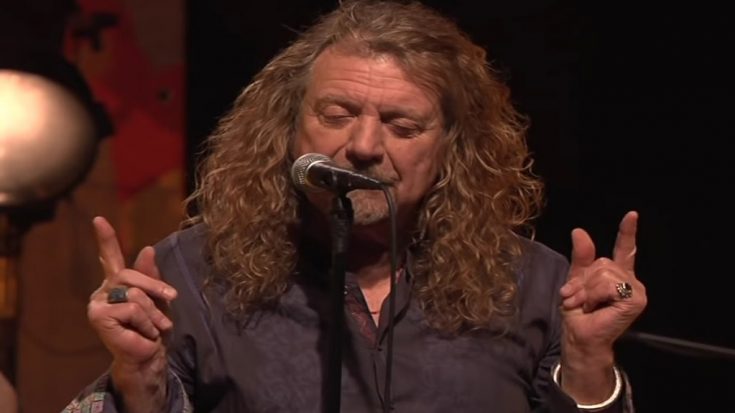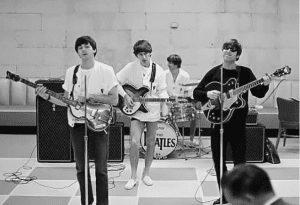Robert Plant Opens Up About His Musical Rebirth With Saving Grace

Robert Plant with the Band of Joy - Robert Plant / YouTube
Robert Plant has spent decades redefining what it means to make music beyond fame, and his latest project, Saving Grace, captures that spirit perfectly. Formed almost by accident, the group began as a gathering of local musicians who shared a love for old songs and intimate performances. For Plant, it was a chance to rediscover the simple joy of making music without expectation or spectacle.
He describes Saving Grace not as a band in the traditional sense, but as a collection of like-minded artists who play purely for the love of it. The lineup includes co-vocalist Suzi Dian, drummer Oli Jefferson, guitarist Tony Kelsey, multi-instrumentalist Matt Worley, and cellist Barney Morse-Brown. Together, they interpret old gospel and folk tunes alongside modern gems, reshaping them with warmth and depth.
“It’s not about playing the game anymore,” Plant explains. “It’s about being alive to the moment.” That stripped-down approach has become the foundation of his creative rebirth—a return to music’s essence after decades at the center of rock’s grandest stage.
From the Countryside to the Stage
The beginnings of Saving Grace were as organic as the music itself. In 2019, the group started performing unannounced shows in small English towns—no website, no fanfare, just music. Their debut took place in a modest theater in Bishop’s Castle, Shropshire, near Plant’s home. From there, they traveled to places like Bath, Stroud, and Brierley Hill, bringing their blend of folk, gospel, and blues to unsuspecting audiences.
Plant coined the phrase “Nobody knows what it’s like” to describe their early days—a nod to how the project existed entirely outside the spotlight. Tickets were cheap, venues were intimate, and the connection with the crowd was genuine. “We’d turn up and play places where people come out and have a great time,” he recalls.
For Plant, these evenings in small towns carry more meaning than any high-profile gathering. “I’ve been with Obama, I’ve been with Prince Charles,” he says with a laugh. “But going to these towns, playing to a packed hall of people wondering what the hell I’m doing there—that’s the real magic.”
https://twitter.com/historyrock_/status/1957945674974302653
Capturing the Spirit of Simplicity
The recording of Saving Grace was as spontaneous as its formation. During the pandemic, Plant and his bandmates began playing outdoors near his countryside home, recording in open fields and rustic barns. One early session for the track “Gospel Plough” was literally captured in a field, with microphones connected by long cables to a makeshift mixing setup inside his house.
Plant fondly recalls the process as “amateur hour,” but in truth, it was deliberate in its simplicity. “If we can capture the moment naturally, why not?” he says. That philosophy led the group to record songs in barns, old halls, and other unpolished spaces, embracing the imperfections that give music its soul.
The result is an album that feels alive and human—an antidote to the overproduced sound of modern music. Saving Grace carries a warmth that reflects both the place it was made and the unforced camaraderie of its creators.
Breaking Free From Expectations
Plant’s musical rebirth didn’t begin with Saving Grace—it’s part of a long journey of reinvention that stretches back to the early ’90s. After decades of being defined by Led Zeppelin, he made a conscious choice to move away from rock stardom and toward creative freedom. “I made a great escape,” he says. “I really got out of the way.”
The turning point came with his 1993 album Fate of Nations, which saw him stepping beyond the shadow of his past. From there, projects like Band of Joy, Dreamland, and The Sensational Space Shifters showed a man following curiosity over commercial success. Each new chapter has been about collaboration, exploration, and growth.
“I can’t be anything but interested,” Plant admits. “I’ve got to keep varying it, otherwise I won’t believe in it.” That constant hunger for discovery is what has kept him vital long after most of his peers have settled into nostalgia.
The Road Still Unfolds
At 76, Robert Plant remains restless, his creative fire far from dimmed. He hints at future projects—a new Band of Joy record, more collaborations with Alison Krauss, and even unreleased Saving Grace material “falling out of the trunk of his car.” The thrill of creating still drives him, and he sees no reason to stop.
“When you sing, you sing,” he says. “You don’t say, ‘I’ll stop now.’ You carry on singing.” It’s a simple statement that sums up a lifetime of passion—a refusal to let art become routine. For Plant, every song is a new conversation with the past, the present, and whatever lies ahead.
More than half a century after Led Zeppelin, Saving Grace isn’t just another project—it’s proof that reinvention doesn’t end with age or success. For Robert Plant, music remains what it always was: an open road, waiting to be traveled again.












